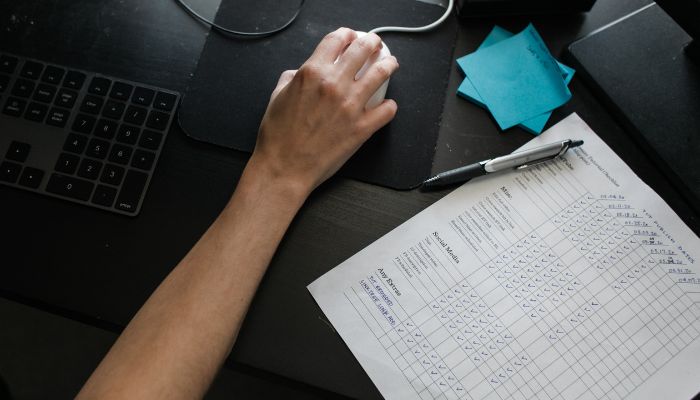
Just as a locksmith safeguards your home, background checks protect your personal and professional life. You’ve likely encountered them when applying for jobs or renting an apartment. But do you know who’s behind these checks?
Background checks are conducted by a variety of entities including employers, landlords, financial institutions, government agencies, and educational institutions to verify an individual’s history and credentials.
It’s not just employers or landlords; there’s a whole industry dedicated to this task. Dive in, and let’s demystify the process, uncovering who does background checks, how they do it, and the legal aspects involved.
Table of contents
Understanding Background Checks
Before you dive into the world of background checks, it’s important to understand what they are, how they work, and how to obtain a background check. A background check is a process used by individuals, companies, or organizations to verify a person’s identity and assess their suitability for a particular role.
There are different types of background checks, but they all aim to provide a comprehensive picture of an individual’s character and history.
Pre-employment background checks, for instance, are conducted by employers to ensure you’re a reliable, trustworthy candidate. This type of background check usually involves confirming your education and employment history, checking your criminal record, verifying your references, and sometimes even assessing your financial history. The depth and breadth of a background check can vary depending on the nature of the job, the organization’s policy, or the legal requirements.
The background check process involves gathering information from various databases and records. It’s not just about finding ‘dirt’ on someone, but rather understanding their past to predict future behavior. So, in essence, understanding background checks is all about understanding the value of thorough, accurate information.
Now, let’s transition into discussing who actually conducts these background checks.
Who Conducts Background Checks?

You might be surprised to learn that a wide variety of entities conduct background checks.
From employers scrutinizing potential hires to landlords vetting prospective tenants, these checks are a common practice.
Even financial institutions, government agencies, and volunteer organizations rely on them to mitigate risks.
Employers and job screenings
In the job market, it’s typically your potential employers who conduct background checks as part of their pre-employment screening process. This background screening process is crucial in verifying the information you provide in your job application. It’s not uncommon for potential employers to delve into your past, checking your criminal records, credit history, and educational background. They might also conduct an employment verification to confirm your previous job titles, duties, and tenure.
This comprehensive examination helps employers ensure they’re hiring trustworthy, qualified individuals. So, the next time you apply for a job, remember that your potential employer might be scrutinizing your past.
Now, let’s shift our focus to another group that frequently conducts background checks: landlords for tenant screenings.
Landlords for tenant screenings
Aside from employers, landlords also carry out background checks to screen potential tenants. This process, often termed as tenant background screenings, involves a comprehensive review of your personal and financial history. It’s a crucial step that helps landlords assess your reliability as a potential tenant. They typically include credit checks, an assessment of your rental history, and even criminal background checks.
Credit checks help landlords understand your financial stability, while your rental history provides insights into your behavior as a tenant. Criminal checks serve to ensure community safety. It’s essential to understand that these screenings are a standard procedure in the rental process, and not a personal intrusion.
Financial institutions for credit checks
Just like landlords, credit card companies and other financial institutions conduct background checks, specifically credit checks, to assess your creditworthiness before approving your application. They use the services of credit bureaus to obtain your credit reports, which contain details of your credit history.
These financial institutions scrutinize your past borrowing and repayment habits, outstanding debts, and your record of meeting financial obligations. Why? They’re mitigating risk. They want to ensure that you’re capable of repaying any credit they extend to you.
Government agencies for security clearances
Beyond the realm of financial institutions, if you’re pursuing a job within a government agency, particularly in positions dealing with national security, you’ll find they also perform rigorous background checks, often going beyond your credit history. These security checks are designed to ensure your suitability for the role and the safety of the public trust. The federal agency conducting the checks will typically look into:
- Criminal records
- Education and employment verification
- References and interviews
- Financial information
These elements, along with others, are considered to evaluate your reliability, trustworthiness, and loyalty to the United States. It’s crucial to be aware of this if you’re aiming to work in national security.
Volunteer organizations
In the same vein, if you’re considering volunteering, you should know that many volunteer organizations also conduct background checks to ensure the safety and integrity of their operations. The hiring process in these organizations isn’t taken lightly. Just like potential employees in the corporate world, volunteers may go through a background screening service.
These checks are all about risk management. Record checks are a crucial part of this process. They help organizations to identify any past criminal behavior, preventing any potential harm to the community they serve.
Adoption agencies
You mightn’t know this, but adoption agencies are another group that commonly conducts background checks. In an effort to ensure the safety of children in their care, these agencies perform extensive investigations on prospective employees. This helps them make informed decisions.
The agencies typically:
- Conduct reference checks to verify an applicant’s character and experience.
- Perform criminal records checks with the assistance of a law enforcement agency.
- Look into an individual’s financial stability.
- Review the applicant’s history of substance abuse, if any.
These checks are critical in ensuring that the children are placed in safe, loving homes.
Why Do Organizations Conduct Background Checks?

In today’s fast-paced world, trust is a valuable commodity. Organizations, whether they are businesses, government agencies, or non-profits, often find themselves in positions where they need to make quick yet informed decisions about individuals. One of the primary tools they use to achieve this is the background check. But why is this process so crucial? This brings us to the background check importance.
Ensuring Safety and Security
Safety is paramount in any organization. Whether it’s a school hiring a teacher, a financial institution taking on a new employee, or a city employer recruiting for a public service role, ensuring that those who join the team do not pose a threat is essential.
Criminal background checks, which look into criminal records and felony convictions, help organizations identify if an individual has a history that might jeopardize the safety of others. Furthermore, checks against public records can reveal restraining orders or other legal issues that might be of concern.
Verifying Credentials and Qualifications
It’s not uncommon for individuals to exaggerate or even fabricate parts of their employment history on their job application. Education verification checks ensure that the degrees and qualifications an applicant claims to have are genuine.
Similarly, reference checks with previous employers can confirm the dates of employment and the nature of the job roles held. This process ensures that potential hires have the experience and education they claim, leading to better employment decisions.
Reducing Risks of Fraud and Theft
Fraud and theft can be detrimental to an organization’s reputation and finances. By conducting thorough pre-employment screenings, organizations can identify red flags in an applicant’s past.
For instance, credit reports and credit history checks can provide insights into an individual’s financial responsibility. If a role involves handling money or sensitive financial information, knowing that a prospective employee has a sound financial background can reduce the risk of embezzlement or fraud.
Additionally, criminal record checks can reveal past misdemeanor convictions or other legal issues that might indicate a propensity for dishonest behavior.
Complying with Legal and Regulatory Requirements
Many industries have strict regulatory requirements when it comes to hiring. For instance, the Federal Agency mandates specific checks for federal employment. Positions that involve national security or require access to classified information might necessitate a national background investigation.
In some sectors, failing to conduct these checks can result in hefty fines or legal repercussions. Moreover, organizations must be wary of disparate impact in their hiring practices. Conducting background checks in a consistent manner, and seeking legal advice when necessary, ensures that they remain compliant with the law and avoid potential lawsuits.
In conclusion, background checks, whether they are criminal records checks, social security verifications, or checks into one’s medical history, provide a complete picture of an applicant.
They allow organizations to make informed decisions, ensuring the safety of their stakeholders and the integrity of their operations. As the old adage goes, “It’s better to be safe than sorry,” and in the realm of hiring, this couldn’t be truer.
The Process of Conducting a Background Check

Conducting a background check is a crucial step in many processes, from hiring new employees to renting out properties. It provides a complete picture of an individual’s past, ensuring that decisions made are informed and fair. Here’s a detailed look at how this process unfolds:
Requesting consent from the individual:
Before initiating any background check, it’s essential to obtain the individual’s consent. This is not just a best practice but often a legal requirement.
The Federal Policy mandates that potential employers or any entity conducting the check must inform the individual in writing and get their written authorization. This ensures transparency and upholds the individual’s rights.
Gathering necessary personal information:
Once consent is obtained, the next step involves collecting all the necessary personal details. This includes the individual’s full name, date of birth, Social Security number, and other relevant details. This information serves as the foundation for the background check report.
Checking criminal records, employment history, and educational qualifications:
- Criminal Records: One of the primary components of a background check is verifying an individual’s criminal histories. This includes checking for felony convictions, misdemeanor convictions, and any other criminal convictions. Law enforcement agencies and county courts often maintain these records.
- Employment History: Verifying an individual’s employment history ensures that they have the experience and track record they claim. This includes checking dates of employment, positions held, and reasons for leaving previous jobs. Previous employers can provide insights into an individual’s performance and behavior.
- Educational Qualifications: Education verification is crucial, especially for positions that require specific degrees or certifications. This step ensures that the individual has genuinely obtained the qualifications they claim to have.
Verifying references:
Reference checks are an integral part of the background check process. They provide a more personal insight into an individual’s character and work ethic. By speaking to former employers, colleagues, or even personal references, organizations can get a better understanding of the individual’s suitability for a role or responsibility.
Reporting the findings:
Once all the information is gathered and verified, it’s compiled into a background check report. This report provides a comprehensive overview of the individual’s background, from criminal records checks to credit reports. It’s essential for this report to be accurate. Organizations like the Consumer Financial Protection Bureau ensure that these checks are conducted fairly and without any disparate impact.
Legal Aspects of Background Checks
When it comes to background checks, it’s crucial to understand the legal obligations and restrictions that govern their use. You should seek legal advice to ensure you’re compliant with all the relevant laws and regulations. This is particularly important because the misuse of a background check report can lead to labor employment law litigation.
One key area of legal consideration is the criminal record check. It’s a federal offense to misuse the information from this type of check for discriminatory employment decisions. For instance, denying someone a job solely based on a criminal record could be a violation of their rights.
Furthermore, it’s vital to obtain the subject’s written consent before conducting a background check. Without this, you risk infringing upon their privacy rights, which can lead to legal complications.
Finally, keep in mind that laws governing background checks vary by state and industry. So you need to ensure you’re familiar with the specific laws applicable to your situation. A specialist in employment law can provide valuable guidance.
Conclusion
In the end, it’s clear that background checks are a critical tool in today’s world. They serve as a safety net, catching potential issues before they become significant problems.
From employers to landlords, many key players carry out these checks. They tread a fine line, balancing legal requirements and privacy rights.
So, remember, background checks aren’t just a bureaucratic hurdle, they’re the lighthouse guiding safe decisions in a sea of uncertainty.
FAQs (People Also Ask)
How long does a background check take?
A typical background check can take anywhere from a few hours to several days, depending on the depth and scope of the investigation. For instance, a National Background Investigation might take longer than a simple Criminal Record Searches. Additionally, checks that involve County Criminal records or delve into specific County Seat databases might require additional time.
Can I refuse a background check?
Yes, you can refuse a background check. However, it’s essential to understand the implications. For instance, if a Future Employer requires a background check as a Business Necessity, refusing might result in an Adverse Hiring Decision. Always read the Employment Application thoroughly and seek Informed Consent before making a decision.
What shows up on a background check?
A background check can reveal various information, from Education History and Salary History to Juvenile Convictions and Tax Liens. Some employers might even conduct Social Media Searches or consult Consumer Reports. If you’ve worked with the United States Army Reserve On Employment, that might also appear in some specialized checks.
How can I prepare for a background check?
To prepare, ensure that all information on your Employment Application is accurate to avoid being labeled a Bad Hire or Wrong Hire. Be honest about any Lies On Job Applications and familiarize yourself with your rights, especially concerning National Origin and Sexual Orientation discrimination. It might also be beneficial to review any Public Information & Records about yourself and consult Screening And Selection Services like ADP Screening And Selection Services for a pre-check.